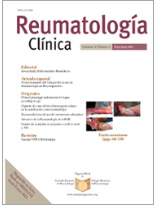Nunca nos cansamos de decir a nuestros pacientes que se muevan, que sigan haciendo ejercicio, que no dejen de mantenerse activos, que eso es lo mejor para ellos. Pero, a veces, el miedo al dolor les paraliza.
Sin embargo las pruebas son inequívocas, y los estudios avalan científicamente que la evolución es mejor si mantenemos el ejercicio en nuestras vidas, a pesar de tener enfermedades como la artritis reumatoide o la artrosis. Si hay alguna duda, estas recomendaciones Eular lo dejan clarísimo.
12th July, 2018, Kilchberg, Switzerland – The European League Against Rheumatism, EULAR, has published a set of recommendations for health professionals regarding physical activity in people with rheumatoid arthritis, spondyloarthritis and osteoarthritis. The recommendations report in detail on the meta-analysis that was performed to answer the question on the effectiveness of physical activity interventions.
The findings of the report show that exercising and physical activity (PA) promotion, according to public recommendations for PA, were effective on cardiovascular fitness and muscle strength, with moderate – and thus clinically relevant – effect sizes in people with rheumatoid arthritis (RA), spondyloarthritis (SpA) and osteoarthritis (OA).
A systematic review and meta-analysis were performed using data up to April 2017. Randomised controlled trials (RCTs) in adults (≥ 18 years) with RA, SpA and OA were performed to investigate the effect of exercise or PA promotion on cardiovascular fitness, muscle strength, flexibility, neuromotor performance, and daily PA. The systematic review included 63 RCTs, of which 44 (3469 people with RA, SpA, OA) were included in the meta-analysis. Moderate effects were found of aerobic exercises and resistance training on cardiovascular fitness and muscle strength respectively, but no effect of combined exercises on flexibility. PA promotion interventions produced a small increase in PA behaviour.
The benefits of PA is obvious in people with RA, SpA and osteoarthritis OA, and exercise is the cornerstone of the EULAR recommendations for the non-pharmacological disease management of OA and axial spondyloarthritis. The EULAR recommendations for PA in people with SpA, RA and OA provide four overarching principles and ten recommendations which suggest PA as an integral part of standard care throughout the course of disease in people with Spa, RA and OA, given its effectiveness, safety, and feasibility.
The four overarching principles are:
Physical activity is part of a general concept to optimise health related quality of life.
Physical activity has health benefits for people with RA/SpA/OA.
General physical activity recommendations including the four domains (cardiorespiratory fitness, muscle strength, flexibility and neuromotor performance) are applicable (feasible and safe) to people with RA/OA/SpA.
The planning of physical activity requires a shared decision between health care providers and people with RA/SpA/OA, which takes people’s preferences, capabilities, and resources into account.
The recommendations are based on a systematic review of the literature (SR) with qualitative and if possible quantitative analysis, i.e. a meta-analysis, as part of the EULAR Standardised Operating Procedures (SOPs) for the development of recommendations. The SR only included studies that met the dose for effective PA according to the public health recommendations for PA from the American College of Sports Medicine (ACSM).
The recommendations for PA in people with SpA, RA and OA may constitute a bridge between arthritis-specific exercises and public health recommendations for PA. They are also important as clinical practice shows that patients and clinicians may still believe that PA and exercising according to public health recommendations is potentially harmful and accelerate disease progression. Furthermore, the best strategy for the promotion of daily PA is still a matter of debate and a challenge for health professionals. However there is evidence for the effectiveness of behaviour change techniques (BCT) in PA promotion.
The World Health Organisation (WHO) recommends that adults, including elderly or people with chronic conditions, perform at least 150 minutes of moderate-intensity or 75 minutes of vigorous-intensity physical activity per week, and additional muscle strengthening activities involving major muscle groups on at least two days a week. The ACSM recommends additional regular performance of flexibility and neuromotor activities such as balance, or agility.



